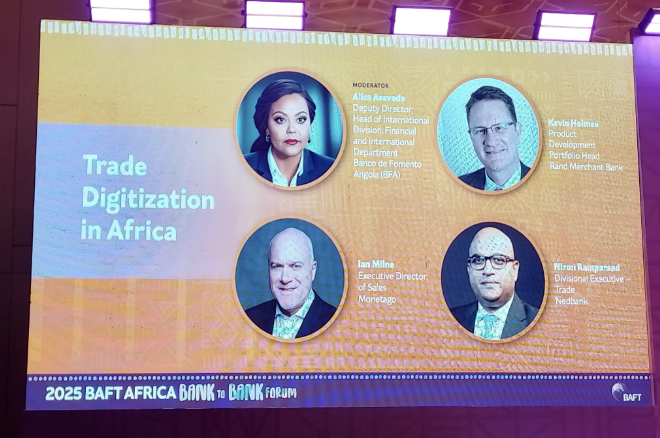 Panelists at the GTR East Africa 2025 during a discussion on trade digitisation in Africa
Panelists at the GTR East Africa 2025 during a discussion on trade digitisation in AfricaLeaders in trade and finance from across Africa and beyond have gathered in Nairobi for GTR East Africa 2025.
The high-profile forum focused on unlocking the continent’s trade finance potential through digital innovation.
Held at the JW Marriott Hotel, the event drew more than 40 senior executives and policymakers to discuss how technology can transform Africa’s trade landscape, with a special focus on small and medium-sized enterprises (SMEs).
A centrepiece of the discussions was the African Continental Free Trade Area (AfCFTA), a landmark agreement aimed at integrating trade across 54 African countries.
While panellists acknowledged the formidable challenges facing AfCFTA’s implementation, consensus emerged that digital tools could be pivotal in overcoming these hurdles.
Streamlining customs processes, harmonising documentation, and ensuring consistency in trade practices were highlighted as key benefits of digitisation.
“African-led digital solutions are not just preferable—they are essential,” emphasised multiple speakers, stressing that homegrown technology must be built to reflect the continent’s diverse economic realities.
Among the standout voices was Ian Milne, Executive Director of Sales at MonetaGo, a global fintech company driving trade finance digitisation.
With over three decades in structured trade and commodity finance, Milne advocated for invoice-backed early payment mechanisms as a practical solution to SME liquidity challenges.
“There is a need for early payment mechanisms tied to invoices, purchase orders, or warehouse receipts,” Milne said.
He pointed to India’s successful adoption of digital invoice discounting as a roadmap for Africa. “With the right regulatory framework and public-private partnerships, we can replicate that success here.”
Milne’s optimism was echoed by Niron Rampersad, Divisional Executive for Trade at Nedbank.
Rampersad underscored the importance of strategic collaboration among banks, fintechs, and logistics providers.
He cited partnerships with firms like DP World as evidence of digital innovation creating real-world impact, especially in bringing SMEs into formal trade networks.
Kelvin Holmes, Product Development Portfolio Head at Rand Merchant Bank, brought a design-centric view to the panel, highlighting the importance of user-friendly financial tools.
“Digital finance must be practical, accessible, and tightly integrated with supply chain operations,” Holmes said. He advocated for agile, locally-informed product development as essential for widespread adoption.











